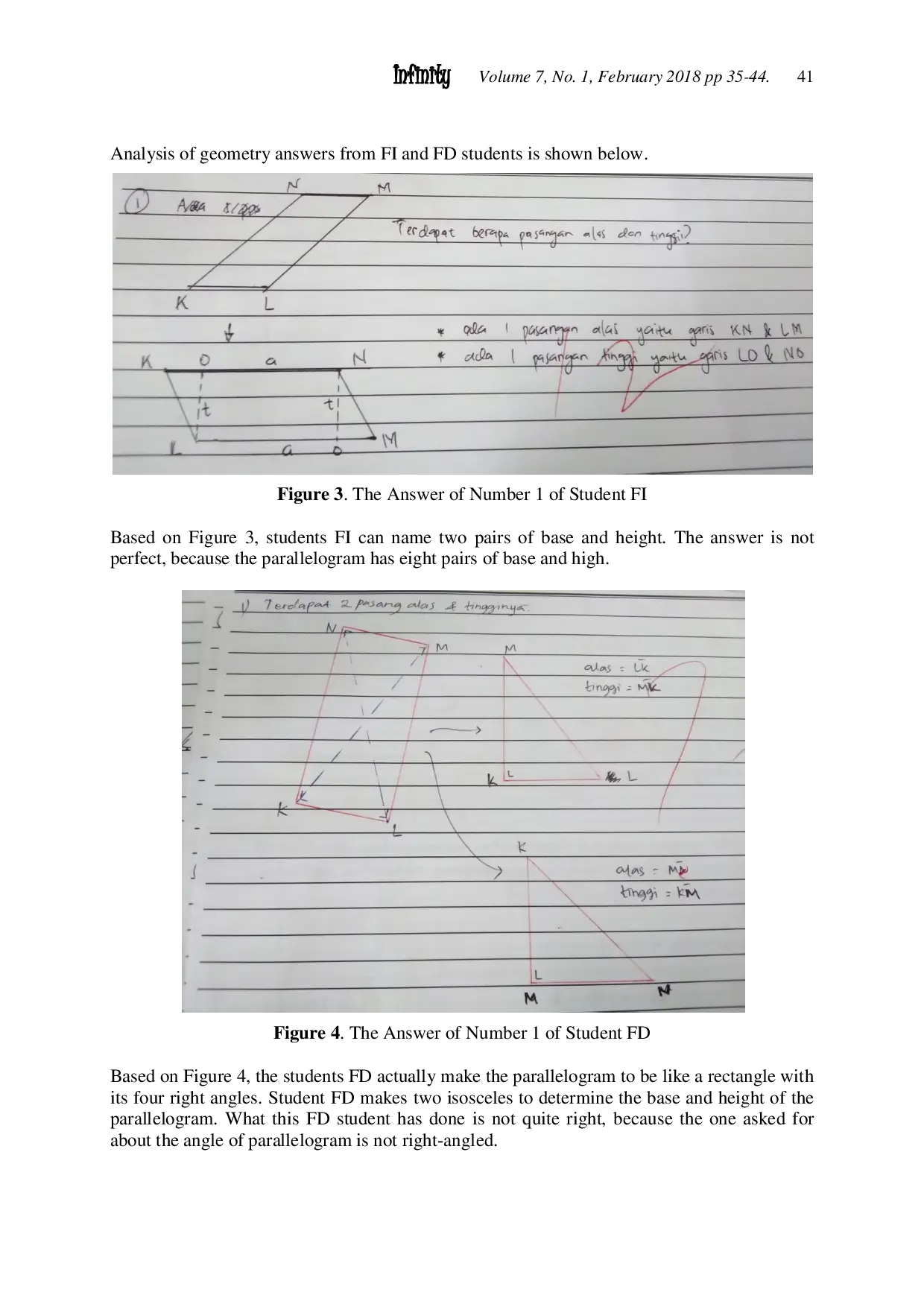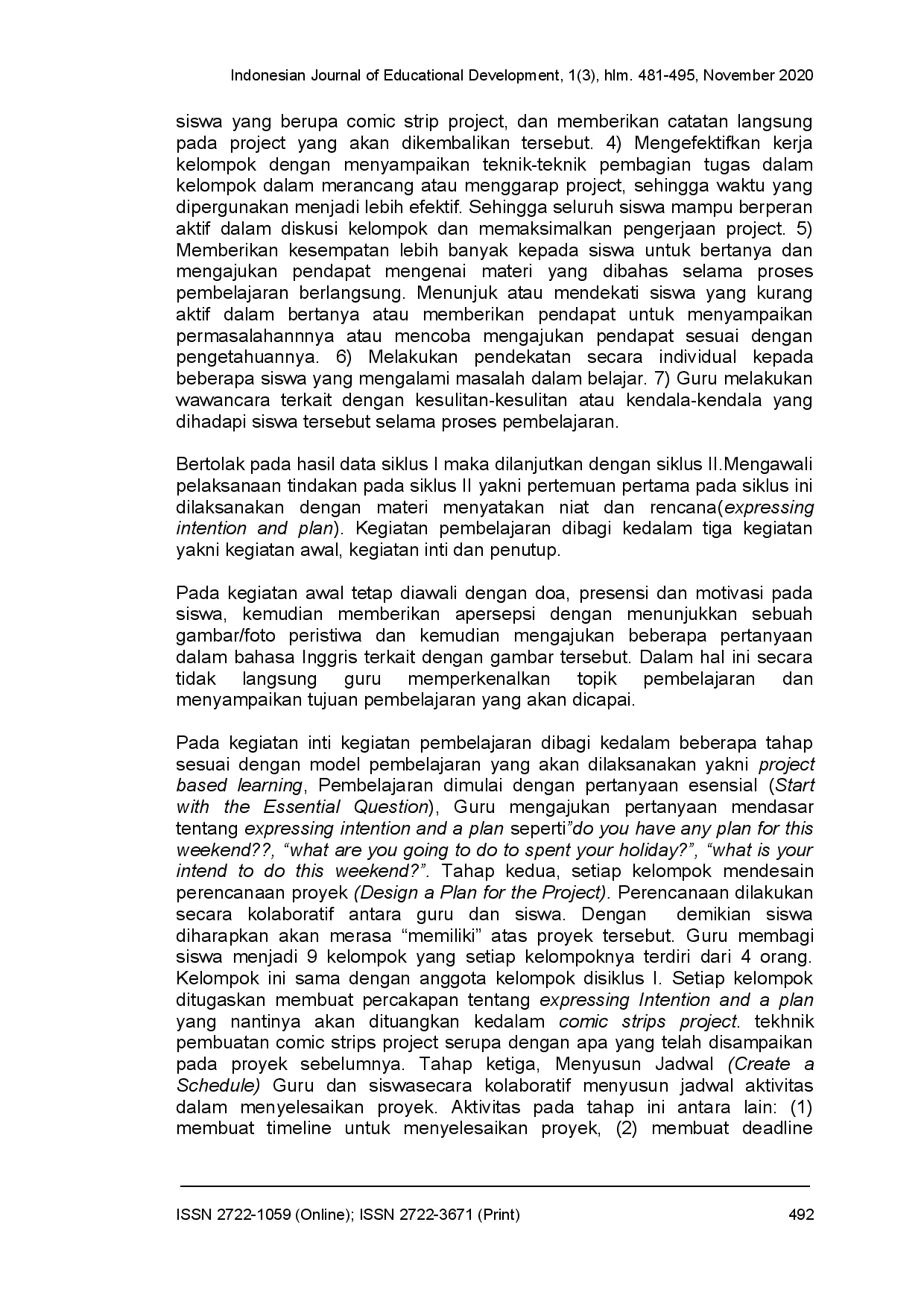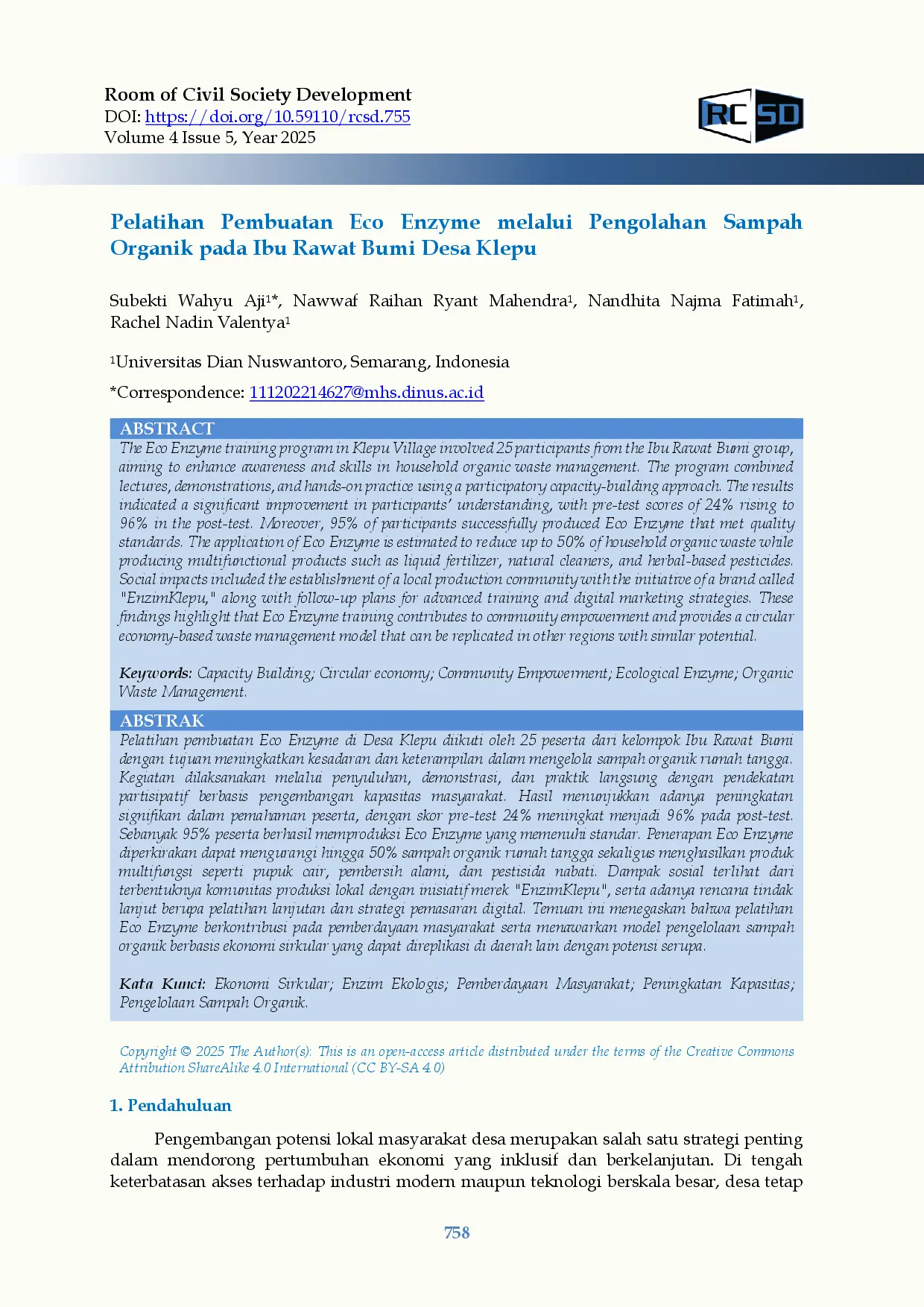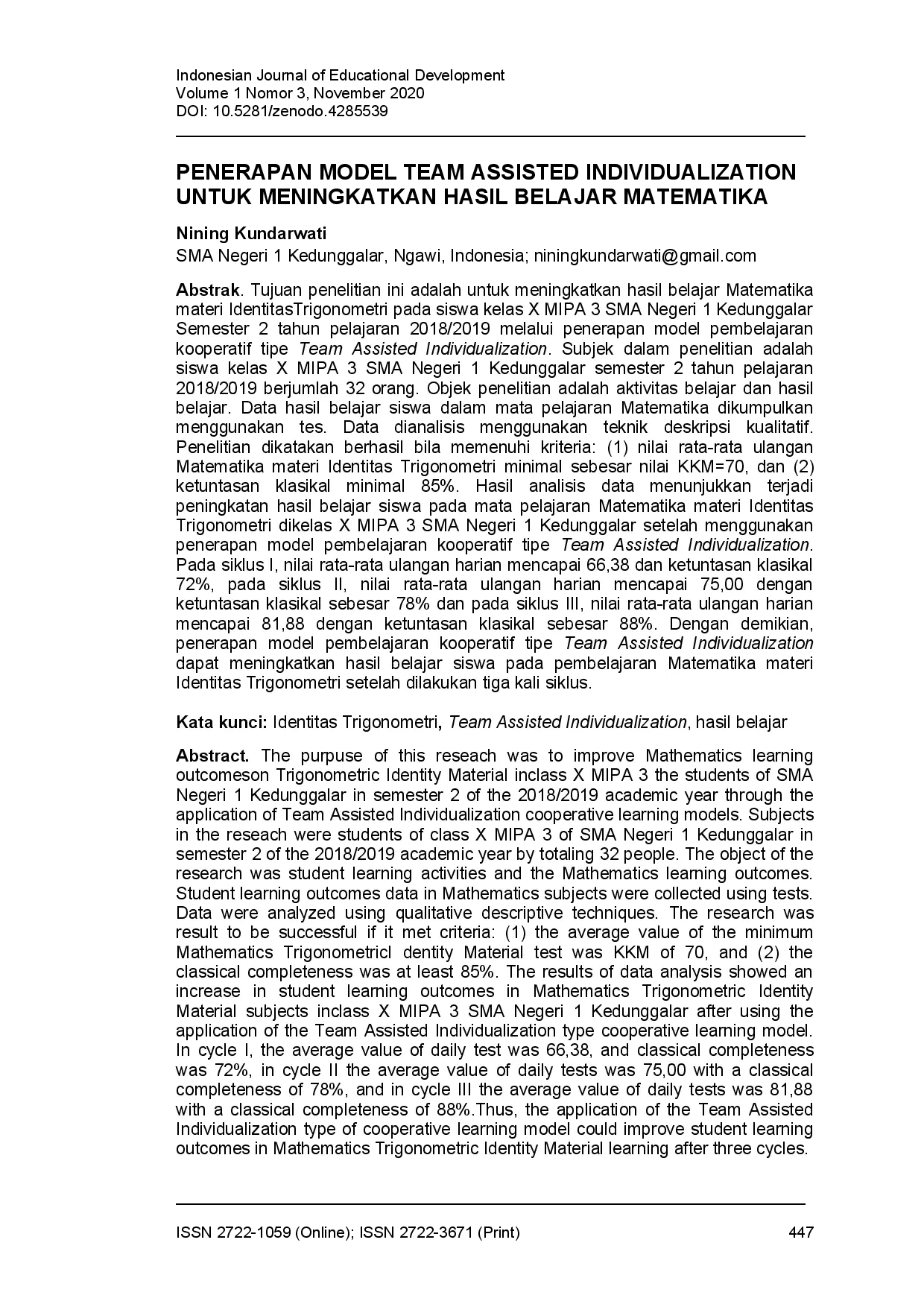IKIP SILIWANGIIKIP SILIWANGI
Infinity JournalInfinity JournalThis study is a quasi-experiment aimed at determining the difference in students mathematics achievement when using guided discovery learning and the JIGSAW type cooperative learning model. The population of this study is all students at SMA N 3 P. Siantar. Cluster random sampling was used to select samples for experimental class I (X-1, 36 students) and experimental class II (X-6, 36 students). Student achievement was measured using an essay test. Data normality was tested using Lilliefors test, and homogeneity was tested using Fishers test, both indicating normal and homogeneous data. Data analysis used a t-test at a significance level of α = 5%. The results showed a significant difference in student achievement in mathematics between the two learning models, with t = 2.504 at α = 0.05 and df = 1.995, leading to the rejection of the null hypothesis.
The research concluded that there is a significant difference in mathematics achievement between students taught using guided discovery learning and those taught using the JIGSAW type cooperative learning model at SMA N 3 P.Students who were taught using the guided discovery learning model demonstrated higher achievement scores.This is likely due to the guided discovery model actively involving students in the learning process and building upon their prior knowledge, fostering a more meaningful and memorable learning experience.
Further research could explore the implementation of guided discovery learning in different mathematical topics and grade levels to assess its broader applicability. Investigating the specific cognitive processes activated during guided discovery, such as problem-solving strategies and metacognitive awareness, could provide insights into its effectiveness. Additionally, studies could examine the impact of combining guided discovery with other innovative teaching methods, like technology-enhanced learning, to create more engaging and effective learning environments. Considering the challenges encountered in the JIGSAW model, future research could focus on strategies to improve student engagement and ensure equitable participation within JIGSAW groups, potentially through targeted teacher training or modified group structures. Finally, exploring the long-term retention of mathematical concepts learned through guided discovery compared to traditional methods would be valuable in understanding its lasting impact on student learning.
| File size | 794.8 KB |
| Pages | 10 |
| DMCA | ReportReport |
Related /
IKIP SILIWANGIIKIP SILIWANGI Instrumen yang digunakan berupa tes psikiatrik GEFT dan tes hasil belajar. Analisis data yang digunakan pada penelitian ini adalah analisis regresi linearInstrumen yang digunakan berupa tes psikiatrik GEFT dan tes hasil belajar. Analisis data yang digunakan pada penelitian ini adalah analisis regresi linear
MAHADEWAMAHADEWA Data penilaian menulis siswa dikumpulkan dari rubrik penilaian menulis sedangkan tanggapan siswa terhadap penerapan model PJBL pada strip komik dikumpulkanData penilaian menulis siswa dikumpulkan dari rubrik penilaian menulis sedangkan tanggapan siswa terhadap penerapan model PJBL pada strip komik dikumpulkan
MAHADEWAMAHADEWA Model ini juga meningkatkan hasil belajar siswa, di mana rata-rata nilai meningkat dari 65,45 ke 77,17 dan ketuntasan klasikal dari 58% ke 94%. RekomendasinyaModel ini juga meningkatkan hasil belajar siswa, di mana rata-rata nilai meningkat dari 65,45 ke 77,17 dan ketuntasan klasikal dari 58% ke 94%. Rekomendasinya
INTELEKTUALINTELEKTUAL Untuk pengumpulan data, kuesioner survei dibagikan dan dianalisis secara kuantitatif. Hasilnya menunjukkan bahwa mayoritas siswa memiliki sikap positifUntuk pengumpulan data, kuesioner survei dibagikan dan dianalisis secara kuantitatif. Hasilnya menunjukkan bahwa mayoritas siswa memiliki sikap positif
Useful /
RCSDEVELOPMENTRCSDEVELOPMENT Pelatihan pembuatan Eco Enzyme di Desa Klepu menunjukkan bahwa pendekatan partisipatif mampu meningkatkan kapasitas masyarakat dalam waktu yang relatifPelatihan pembuatan Eco Enzyme di Desa Klepu menunjukkan bahwa pendekatan partisipatif mampu meningkatkan kapasitas masyarakat dalam waktu yang relatif
NASIONALNASIONAL Hasil panen kacang panjang mencapai 25 ton per hektar, sementara sayuran daun seperti bayam dan kangkung dipanen setiap 25 hari dengan produktivitas tinggi.Hasil panen kacang panjang mencapai 25 ton per hektar, sementara sayuran daun seperti bayam dan kangkung dipanen setiap 25 hari dengan produktivitas tinggi.
MAHADEWAMAHADEWA Adapun saran yang diajukan untuk penyempurnaan pembelajaran dengan metode guru tamu dengan studi ekskursi adalah sekolah perlu memprogramkan mendatangkanAdapun saran yang diajukan untuk penyempurnaan pembelajaran dengan metode guru tamu dengan studi ekskursi adalah sekolah perlu memprogramkan mendatangkan
MAHADEWAMAHADEWA Data hasil belajar siswa dalam mata pelajaran Matematika dikumpulkan menggunakan tes. Data dianalisis menggunakan teknik deskripsi kualitatif. PenelitianData hasil belajar siswa dalam mata pelajaran Matematika dikumpulkan menggunakan tes. Data dianalisis menggunakan teknik deskripsi kualitatif. Penelitian







